October 31, 2014
Edited by David Sanders
Specimen Days
1291 – Philippe de Vitry, French composer/poet, is born.
1750 – Leonor de Almeida marquesa de Alorna, Portuguese poet, is born.
1795 – John Keats, London, England, romantic poet (Ode to a Grecian Urn), (d. 1821), is born.
1875 – Seerp Anema, poet/writer (Dutch Coasts), is born.
1888 – Napoleon Lapathiotis, Greek poet (d. 1944), is born.
1902 – Carlos Drummond de Andrade, Brazilian poet (Claro Enigma), is born.
1950 – Carel T Scharten, Dutch poet/writer (Lost Paradise), dies at 72.
1985 – Nikos Engonopoulos, Greek painter and poet (b. 1907), dies.

The children looked at the sky: it was not forbidden.
Mouth, nose, eyes were open. There was no danger.
What Clara feared were the flu, the heat, the insects.
Clara feared missing the eleven o'clock trolley:
She waited for letters slow to arrive,
She couldn't always wear a new dress. But she strolled in the garden,
in the morning!
They had gardens, they had mornings in those days!
—from ”Souvenir of the Ancient World” by Carlos Drummond de Andrade (1902–1987)
World Poetry
Russian Poetry Lover Gets 8 Years for Murder of Prose Fan
Many a Russian night has been passed disputing the merits of literature around a kitchen table – but few end in murder. A 53-year-old former teacher and poetry lover from the Urals has been sentenced to eight years in a penal colony for stabbing his 66-year-old friend to death during an argument about literary forms. More.
Ghanaian Poet Wins Japan-Russia Contest
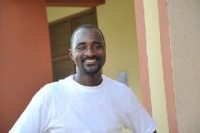
Mr. Adjei Agyei-Baah, a poet and a lecturer in Strategic Management from Ghana, has emerged one of the winners of the prestigious Third Japan-Russia Haiku contest, organized annually by Akita International University, Japan. More.
Recent Reviews
Top of the List
by Martin Stannard
When Paul Violi died of cancer at the age of 66 in April 2011 we were deprived way too early not only of a really good person but also of one of our most inventive, funny, moving and life-enhancing poets. With the cooperation of Paul's widow Ann, his friends the poets Charles North and Tony Towle have put together a posthumous collection of what they could best figure out, after going through his papers, were Violi's uncollected and later un/published and/or finished poems. It makes for a slim but very welcome coda to a fine body of work. More.
Beyond The Jaded Fixities
by Matthew Campbell
Conor O’Callaghan might be talking about his own poetry in the introduction to this terrific gathering of five contemporary Irish poets when he says that each “has long since got beyond the jaded fixities of land and history and faith and nationhood.” To this he adds, “If the poets here are collectively indicative of any one thing in Irish poetry, it is of a reaction that occurred gradually towards greater formal determinism, a more international perspective, empiricism, rationalism and wit” (xv). In that odd but satisfying phrasing—“a reaction … towards”—O’Callaghan describes the turn away from free verse and “the quasi-mystical” in poetry written from the ’90s onwards, as well as an opening to new subject-matter and modes. More.
Bedouin of the London Evening Review – Rosemary Tonks’s Lost Poems

by Kate Kellaway
The photograph of Rosemary Tonks on the cover of this book was taken by the Observer’s Jane Bown in the 1960s. Tonks sits in a Soho cafe wearing tweed trousers, with a mannish beauty and a determination about her stance that extends to the set of her jaw. What is most interesting is the strength of her presence, because what she would become famous for is absence. After making her name between 1963 and 1974 – her work celebrated by Cyril Connolly, Al Alvarez and Philip Larkin – she went missing in the 70s. In a 2009Radio 4 documentary, Brian Patten speculated about her whereabouts in vain. More.
Broadsides
Essay
by Aime Williams
Religious language leans on the apophatic, on the idea that cosmic reality might elude our words. ‘We live on a little island of the articulable,’ writes the Christian novelist Marilynne Robinson, ‘which we tend to mistake for reality itself.’ Gilead, her second book, is narrated by Rev. Ames, a dying churchman writing a long letter to his young son. ‘There is a reality in blessing,’ says Ames, ‘it doesn’t enhance sacredness, but it acknowledges it, and there is a power in that…’ To bless is to acknowledge the inarticulable. It’s an idea Brenda Shaughnessy alludes to; she rarely writes in a way that might be described as religious, but ‘Artless’ shares with older religious poetry a mode of describing an annexed reality. More.
Poetry Brothel Puts the Bawd in Bard

A party where you pay to have verse read to you in a bordello-style setting is packing in the punters. Are poetry and sex work really comparable?
by Sarah Theeboom
I am in the back room of the Backroom cocktail bar in New York, reclining on a fur-covered day bed. Next to me is a woman. She wears a leather corset and harem pants, like a gypsy girl from a fairytale. She is barefoot. In the dim candlelight, she asks what I’m in the mood for – something sexy? Something dark? I tell her what will please me, and she reads me a poem. More.
The Greatest Ex-Nazi Writer
Never heard of Gottfried Benn? It's because of his politics
by Adam Thirlwell
The phenomenon of writers ignored, abused, cast out, disgraced, not for the disaster of their writing but the disaster of their politics, is one contribution the twentieth century has made to the history of literature. Cioran, Kipling, Gorky, you name it: the history of literature has become natty at its particular version of kashrut. We’re therefore now accustomed to the general map of literature being marked by weird absences, small oblivions, fuzzy silences. Mostly, I guess, these oblivions are now so usual that their existence is hardly noticed. Who, for instance, is exercised by the absence in their iBooks library of the German poet Gottfried Benn? And yet Benn—along with Brecht, Celan, and Rilke—is one of the great German poets of the twentieth century, the equal of Eliot or Montale. And the reason for this absence, as usual, is not the work but the life. More.
Drafts & Fragments
'The Second Coming': 12 Times Yeats Has Influenced Pop Culture
While he wrote in a particular political climate of upheaval in Europe after World War I and Ireland during the fight for independence, "The Second Coming" has given voice to people describing their own “end times” ever since. Even if today’s artists don’t quite take the time to understand the references they are making, the words of Yeats are powerful and pervasive. More.
Poetry In the News
Galway Kinnell, Poet Who Followed His Own Path, Dies at 87

Galway Kinnell, who was recognized with both a Pulitzer Prize and an American Book Award for a body of poetry that pushed deep into the heart of human experience in the decades after World War II, died on Tuesday at his home in Sheffield, Vt. He was 87. The cause was leukemia, his wife, Barbara K. Bristol, said. Mr. Kinnell came of age among a generation of poets who were trying to get past the modernism of T. S. Eliot and Ezra Pound and write verses that, as he said, could be understood without a graduate degree.More.
Mandeville Poetry Box Causes a Fuss
Since the invention of the printing press, literature has at times been deployed as an agent of social and political agitation: The Gutenberg Bible helped foment the Protestant Reformation. "Common Sense" challenged the British monarchy. "Uncle Tom's Cabin" exposed the ugliness of American slavery. None of that is happening in Mandeville. Nevertheless, a 25-line poem in a box on a wooden pole at the city's lakefront has stirred at least one of the city's councilmen, who said he wants to know who authorized the poetry box. More.
Dylan Thomas: Michael Sheen Unveils Unpublished Poem in New York
Michael Sheen has read an unpublished poem by Dylan Thomas as part of the ongoing centenary celebrations for the Swansea writer in New York. The Hollywood star – who performed Under Milk Wood on Sunday in the American theatre where Thomas premiered the piece in 1953 – read some of his favourite poems by the Welsh bard at Bauman Rare Books on the 100th anniversary of his birth. One of the poems, Song, has never appeared in any anthology of Thomas’ poems before. It is included in the new centenary edition of Dylan Thomas’s Collected Poems, edited by Professor John Goodby of Swansea University in Wales, a world-leading expert on Thomas. More.
New Wallace Stevens Recordings Reveal a Daring but Human Poet
Wallace Stevens holds a celebrated place in the English poetry canon. Inventive, witty, philosophical, and abstract, his poems successfully experiment with language and redefine the boundaries of the genre. As Helen Vendler, Harvard professor and renowned poetry critic, puts it, “[He] is as good with language as Rembrandt was with paint, or as Balanchine was with dance…the medium is used much more imaginatively.” More.
New Books
To Forget Venice by Peg Boyers
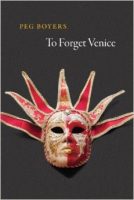
[Paperback] University of Chicago Press, 86 pp., $18.00
To Forget Venice is the improbable challenge and the title of Peg Boyers’s newest collection of poems. The site of several unforgettable years of her adolescence, the place she has returned to more frequently than any other, the city of Venice is both adored and reviled by the speakers in this varied and unconventionally polyphonic work. The voices we hear in these poems belong not only to characters like the mother of Tadzio (think Death in Venice), or the companion of Vladimir Ilych Lenin, or the Victorian prophet John Ruskin and his wife, Effie, but also to wall moss, and sand, and—most especially—an authorial speaker who in 1965, at age thirteen, landed in Venice and never quite recovered from the formative experiences that shaped her there.
Openwork: Poetry and Prose by André du Bouchet
[Hardcover] Yale University Press, 368 pp., $26.00
André du Bouchet, a great innovator of twentieth-century letters, has yet to be fully recognized by a wide circle of international readers. This inviting volume sets out to remedy the oversight, introducing a selection of du Bouchet’s poetry and prose to English-language readers through the brilliant translations of Paul Auster and Hoyt Rogers. Openwork showcases pieces from the author’s entire trajectory, beginning with little-known pieces from the 1950s, followed by major poems from the 1960s, and concluding with works written or rewritten in the poet’s later decades.
Dylan Thomas: A Centenary Celebration by Hannah Ellis
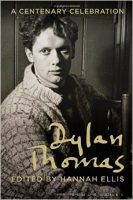
[Hardcover] Bloomsbury USA, 272 pp., $33.00
Comissioned essays celebrating the poet's life and work, and exploring his lasting legacy. Edited by his granddaughter, Hannah Ellis, the book is arranged thematically and includes a wealth of material: essays from noted biographers such as David Thomas and Clive Woosnam explore Thomas's lasting legacy both at home and abroad, and Welsh poet laurete Gillian Clark reflects on the impact of the seminal "play for voices," Under Milk Wood. The book also includes an essays by poet Owen Shears and BBC Radio 6 presenter Cerys Matthews, as well as numerous testimonies and poems from the likes of former president Jimmy Carter, Phillip Pullman, and actor Michael Sheen.
The Red List: A Poem by Stephen Cushman
[Paperback] Louisiana State University Press, 88 pp., $17.95
The "red list" of Stephen Cushman's new volume of poetry is the endangered species register, and the book begins and ends with the bald eagle, a bird that bounded back from the verge of extinction. The volume marks the inevitability of such changes, from danger to safety, from certainty to uncertainty, from joy to sadness and back again. In a single poem that advances through wordplay and association, Cushman meditates on subjects as vast as the earth's fragile ecosystem and as small as the poet's own deflated fantasy of self-importance: "There aren't any jobs for more Jeremiahs."
Don't Let It End Like This Tell Them I Said Something by Paul Vermeersch
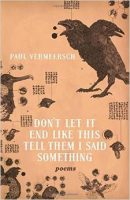
[Paperback] ECW Press, 96 pp., $18.95
Don’t Let It End Like This Tell Them I Said Something — Paul Vermeersch’s fifth collection of poetry — is, as its title suggests, a lyrical meditation on written language and the end of civilization. It combines centos, glosas, erasures, text collage, and other forms to imagine a post-apocalyptic literature built, or rebuilt, from the rubble of the texts that came before.
Correspondences
Fading Hearts on the River by Brooks Haxton
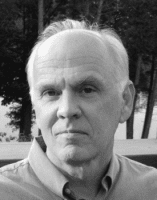
by Chad Holloway
Isaac Haxton is one of the most popular poker players in the world. He’s amassed more than $9.3 million in live tournament earnings — including a runner-up finish to Phil Ivey in the 2014 Aussie Millions AU$250,000 Challenge for $2,525,841 — and millions more playing online. He’s a member of Team PokerStars Pro Online, a former chess prodigy, and a husband and a son. Earlier this year, his father, Brooks Haxton, a noted poet and teacher from Syracuse, New York, released a family memoir titled Fading Hearts on the River: My Son’s Life in Poker. The book isn’t so much a biography of Isaac, though his childhood and rise in poker are well documented, but more a narrative on love, luck, and parenthood. Toss in philosophy, game theory, and poetry, and you have a tale of a father’s love woven from many different fabrics. More.
Poet to Watch: Richie Hofmann

Many critics have called his work “elegant“, which is pretty precise considering how he combines high-art themes of love and architecture, empire and ruin, in order to create these small nuggets of music that are less tapas bar and more 5-course meal. More.
Linux Poetry: A Bridge between Cultures
by Daniel Lisi
Morgan Phillips, a word-savvy tech-mercenary, has cultivated a new culture around an already flourishing operating system. In this interview, we talk about the bridges between computational and natural linguistics, what writing Linux Poetry has taught her, and the future of poetry & programming. You can read Linux Poetry for yourself here. More.
Publishing Poetry in Translation: A Conversation With Lawrence Schimel
by Julie R. Enszer
Lawrence Schimel is the editor and publisher of A Midsummer Night's Press, an influential publisher of poetry. Founded by Schimel in New Haven, CT in 1991, A Midsummer Night's Press first published broadsides of poems by Nancy Willard, Joe Haldeman, and Jane Yolen, among others, in signed, limited editions of 126 copies, numbered 1-100 and lettered A-Z. In 1993, Schimel moved to New York and the press went on hiatus until 2007, when it began publishing perfect-bound, commercially-printed books. More.
Envoi: Editor’s Notes
Why Drake Is One Of The Best Contemporary Poets
by Dorothea Lasky
I often have one poet that I am in love with for a very long time, whose songs I can't ever completely tap out of their inspirational resources. For the past few years, that poet has been Drake. You all likely know who Drake is. Aubrey Drake Graham is the 27 year-old Canadian rapper who in recent years has shot up to astronomical fame, has won a Grammy, has sold countless millions of records all over the globe, and has more number #1 singles than Jay-Z. He's what we all might describe as a phenom. More.
I am not equipped to respond to this. Discuss among yourselves. . .